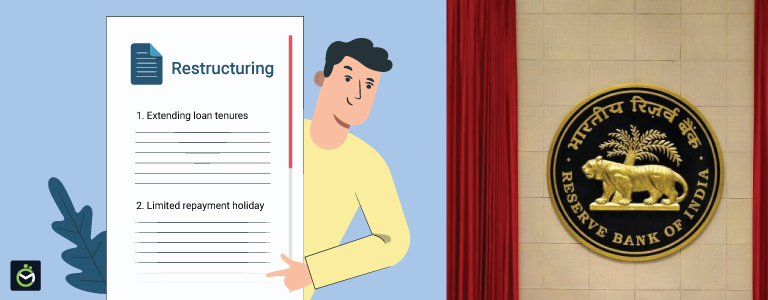

New RBI Guidelines for Loans: No More Compounding Penal Charges
The Reserve Bank of India (RBI) has recently issued new guidelines for loans that will benefit borrowers by eliminating further interest on penal charges. This means that borrowers will no longer have to pay interest on top of the already-imposed penal charges for late payments.
The new guidelines also aim to improve transparency and clarity in lending practices, strengthen borrower protections, and enhance grievance redressal mechanisms.
Here are some of the key takeaways from the new RBI guidelines:
- Lenders are prohibited from charging further interest on penal charges for loans.
- Lending institutions must provide clear and comprehensive disclosures to borrowers, including the terms and conditions of the loan, the repayment structure, and the consequences of default.
- Borrowers have the right to switch between the base rate and the external benchmark without any additional charges.
- Lending institutions must establish robust grievance redressal mechanisms to address borrowers’ complaints promptly and effectively.
The new RBI guidelines are a positive step towards creating a more equitable and transparent lending environment. They will benefit borrowers by reducing the burden of compounding penal charges and making it easier for them to understand the terms and conditions of their loans.
Here are some of the benefits of the new RBI guidelines for borrowers:
- Reduced financial burden: Borrowers will no longer have to pay interest on top of the already-imposed penal charges for late payments. This can significantly reduce the financial burden of borrowers who are struggling to make their loan payments.
- Increased transparency: Lending institutions will be required to provide clear and comprehensive disclosures to borrowers, which will help borrowers make informed decisions about their loans.
- Improved borrower protections: Borrowers will have more rights and safeguards under the new guidelines. For example, they will have the right to switch between the base rate and the external benchmark without any additional charges.
- Enhanced grievance redressal mechanism: Lending institutions will be required to establish robust grievance redressal mechanisms to address borrowers’ complaints promptly and effectively. This will help borrowers to get their complaints resolved quickly and fairly.
The new RBI guidelines are a positive development for the lending industry in India. They will help to create a more equitable and transparent lending environment, which will benefit both borrowers and lenders.
Some related questions and Answers:-
- Q: When will the new RBI guidelines come into effect?
A: The new RBI guidelines will come into effect on October 1, 2023.
- Q: What are the key changes introduced by the new RBI guidelines?
A: The key changes introduced by the new RBI guidelines are:
* Lenders are prohibited from charging further interest on penal charges for loans.
* Lending institutions must provide clear and comprehensive disclosures to borrowers, including the terms and conditions of the loan, the repayment structure, and the consequences of default.
* Borrowers have the right to switch between the base rate and the external benchmark without any additional charges.
* Lending institutions must establish robust grievance redressal mechanisms to address borrowers' complaints promptly and effectively.
- Q: How will the new RBI guidelines benefit borrowers?
A: The new RBI guidelines will benefit borrowers in a number of ways, including:
* Reduced financial burden: Borrowers will no longer have to pay interest on top of the already-imposed penal charges for late payments. This can significantly reduce the financial burden of borrowers who are struggling to make their loan payments.
* Increased transparency: Lending institutions will be required to provide clear and comprehensive disclosures to borrowers, which will help borrowers make informed decisions about their loans.
* Improved borrower protections: Borrowers will have more rights and safeguards under the new guidelines. For example, they will have the right to switch between the base rate and the external benchmark without any additional charges.
* Enhanced grievance redressal mechanism: Lending institutions will be required to establish robust grievance redressal mechanisms to address borrowers' complaints promptly and effectively. This will help borrowers to get their complaints resolved quickly and fairly.
- Q: How will the new RBI guidelines impact lending institutions?
A: The new RBI guidelines will impact lending institutions in a number of ways, including:
* Increased compliance costs: Lending institutions will need to invest in systems and processes to comply with the new guidelines.
* Increased competition: The new guidelines will make it easier for borrowers to compare loan offers, which could lead to increased competition among lending institutions.
* Enhanced customer satisfaction: The new guidelines are designed to improve the overall customer experience, which could lead to increased customer satisfaction.🔗 Join our Telegram Channel! 🔗
📲 Click on the link below to join:
🚀 Stay updated with the latest market trends and insights. 📈📊
In Hindi –
नए आरबीआई दिशानिर्देश: अब दंडात्मक शुल्क पर कोई और ब्याज नहीं
रिजर्व बैंक ऑफ इंडिया (RBI) ने हाल ही में कर्ज के लिए नए दिशानिर्देश जारी किए हैं, जो देर से भुगतान के लिए दंडात्मक शुल्क पर कोई और ब्याज नहीं लगाने से उधारकर्ताओं को लाभान्वित करेंगे। इसका मतलब है कि उधारकर्ताओं को अब देर से भुगतान के लिए पहले से लगाए गए दंडात्मक शुल्क पर ब्याज नहीं देना होगा।
नए दिशानिर्देश उधार प्रथाओं में पारदर्शिता और स्पष्टता में सुधार, उधारकर्ताओं के संरक्षण को मजबूत करने और शिकायत निवारण तंत्र को बढ़ाने के उद्देश्य से भी हैं।
नए आरबीआई दिशानिर्देशों के कुछ मुख्य बिंदु:
- कर्जदाताओं को कर्ज के लिए दंडात्मक शुल्क पर कोई और ब्याज नहीं लगाने की अनुमति है।
- उधार देने वाले संस्थान उधारकर्ताओं को उधार की शर्तें, पुनर्भुगतान संरचना और चूक के परिणामों सहित स्पष्ट और व्यापक प्रकटीकरण प्रदान करने के लिए बाध्य हैं।
- उधारकर्ताओं को आधार दर और बाहरी बेंचमार्क के बीच बिना किसी अतिरिक्त शुल्क के स्विच करने का अधिकार है।
- उधार देने वाले संस्थानों को उधारकर्ताओं की शिकायतों को शीघ्र और प्रभावी ढंग से निपटाने के लिए मजबूत शिकायत निवारण तंत्र स्थापित करना होगा।
नए आरबीआई दिशानिर्देश उधार परिदृश्य में एक सकारात्मक बदलाव का संकेत देते हैं। उधारकर्ताओं के लिए, ये दिशानिर्देश अधिक सुरक्षा, पारदर्शिता और लचीलेपन प्रदान करते हैं। वे अत्यधिक शुल्क के बोझ को कम करते हैं और उधारकर्ताओं को सूचित वित्तीय निर्णय लेने में सक्षम बनाते हैं। दूसरी ओर, उधार देने वाले संस्थान उचित प्रथाओं को अपनाने, पारदर्शिता को प्राथमिकता देने और मजबूत शिकायत निवारण तंत्र स्थापित करने के लिए प्रेरित होते हैं।
नए आरबीआई दिशानिर्देशों के उधारकर्ताओं के लिए लाभ:
- कम वित्तीय बोझ: देर से भुगतान के लिए पहले से लगाए गए दंडात्मक शुल्क पर उधारकर्ताओं को अब ब्याज नहीं देना होगा। यह उन उधारकर्ताओं की वित्तीय बोझ को काफी कम कर सकता है जो अपने ऋण भुगतान को पूरा करने के लिए संघर्ष कर रहे हैं।
- बढ़ी हुई पारदर्शिता: उधार देने वाले संस्थानों को उधारकर्ताओं को स्पष्ट और व्यापक प्रकटीकरण प्रदान करने के लिए आवश्यक होगा, जो उधारकर्ताओं को अपने ऋणों के बारे में सूचित निर्णय लेने में मदद करेगा।
- बेहतर उधारकर्ता संरक्षण: नए दिशानिर्देशों के तहत उधारकर्ताओं के पास अधिक अधिकार और सुरक्षा होगी। उदाहरण के लिए, उन्हें आधार दर और बाहरी बेंचमार्क के बीच बिना किसी अतिरिक्त शुल्क के स्विच करने का अधिकार होगा।
- बेहतर शिकायत निवारण तंत्र: उधार देने वाले संस्थानों को उधारकर्ताओं की शिकायतों को शीघ्र और प्रभावी ढंग से निपटाने के लिए मजबूत शिकायत निवारण तंत्र स्थापित करना होगा। इससे उधारकर्ताओं को अपनी शिकायतों को जल्दी और निष्पक्ष रूप से हल करने में मदद मिलेगी।
नए आरबीआई दिशानिर्देश भारत में उधार उद्योग के लिए एक सकारात्मक विकास हैं। वे एक अधिक समान और पारदर्शी उधार परिवेश बनाने में मदद करेंगे, जो उधारकर्ताओं और उधारदाताओं दोनों को लाभान्वित करेगा।








